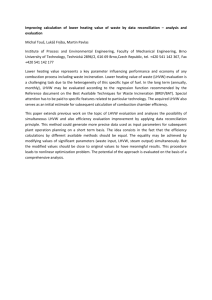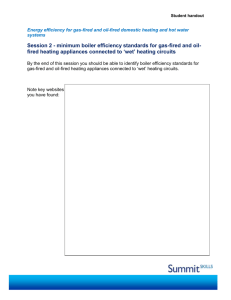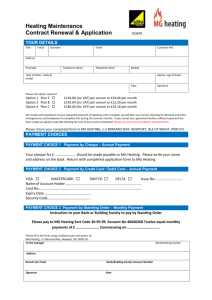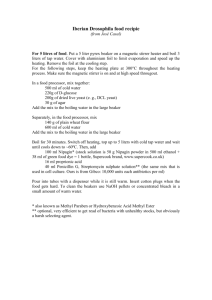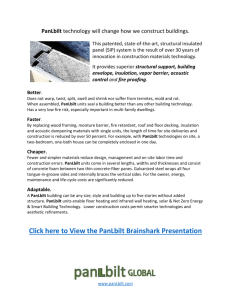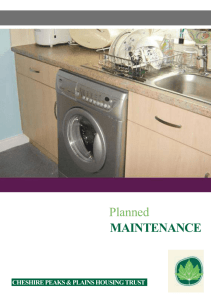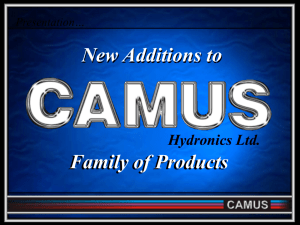0610 Env San Air Quality and Heating Oil Forum Minutes
advertisement
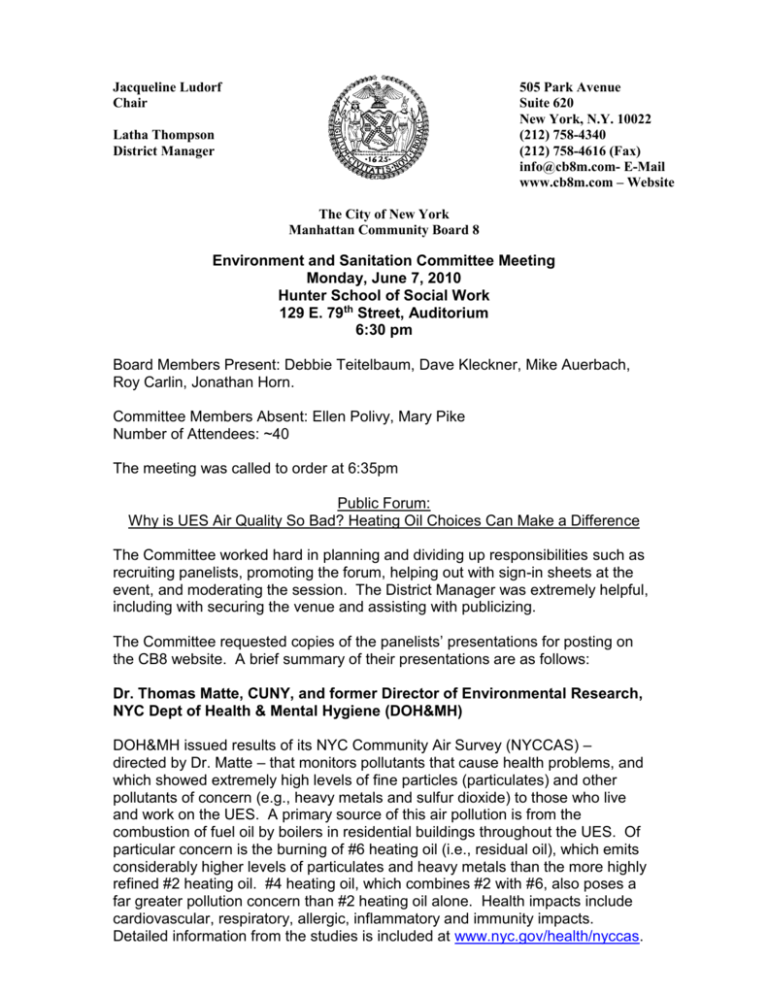
Jacqueline Ludorf Chair 505 Park Avenue Suite 620 New York, N.Y. 10022 (212) 758-4340 (212) 758-4616 (Fax) info@cb8m.com- E-Mail www.cb8m.com – Website Latha Thompson District Manager The City of New York Manhattan Community Board 8 Environment and Sanitation Committee Meeting Monday, June 7, 2010 Hunter School of Social Work 129 E. 79th Street, Auditorium 6:30 pm Board Members Present: Debbie Teitelbaum, Dave Kleckner, Mike Auerbach, Roy Carlin, Jonathan Horn. Committee Members Absent: Ellen Polivy, Mary Pike Number of Attendees: ~40 The meeting was called to order at 6:35pm Public Forum: Why is UES Air Quality So Bad? Heating Oil Choices Can Make a Difference The Committee worked hard in planning and dividing up responsibilities such as recruiting panelists, promoting the forum, helping out with sign-in sheets at the event, and moderating the session. The District Manager was extremely helpful, including with securing the venue and assisting with publicizing. The Committee requested copies of the panelists’ presentations for posting on the CB8 website. A brief summary of their presentations are as follows: Dr. Thomas Matte, CUNY, and former Director of Environmental Research, NYC Dept of Health & Mental Hygiene (DOH&MH) DOH&MH issued results of its NYC Community Air Survey (NYCCAS) – directed by Dr. Matte – that monitors pollutants that cause health problems, and which showed extremely high levels of fine particles (particulates) and other pollutants of concern (e.g., heavy metals and sulfur dioxide) to those who live and work on the UES. A primary source of this air pollution is from the combustion of fuel oil by boilers in residential buildings throughout the UES. Of particular concern is the burning of #6 heating oil (i.e., residual oil), which emits considerably higher levels of particulates and heavy metals than the more highly refined #2 heating oil. #4 heating oil, which combines #2 with #6, also poses a far greater pollution concern than #2 heating oil alone. Health impacts include cardiovascular, respiratory, allergic, inflammatory and immunity impacts. Detailed information from the studies is included at www.nyc.gov/health/nyccas. Isabelle Silverman, Legal Fellow, Environmental Defense Fund Ms. Silverman began her presentation by showing samples of #6 and #2 heating oil – with the #6 observed to be thick, black and opaque while #2 was translucent and resembled cranberry juice. Burning #6 oil emits high levels of particulates and heavy metals, at least 15 times more soot than either #2 heating oil or natural gas. The City is planning to phase out permits for #4 and #6 oil burners (rules not yet published). Although #2 oil is more expensive to buy than #4 and #6, there are substantial savings in boiler/burner maintenance and related costs. And funding for boiler/burner replacements may be available from the U.S. Dept of Energy and from the NY State Energy Research and Development Authority. She also spoke about energy conservation strategies. More information is available at www.edf.org/dirtybuildings. David Kuperberg, CEO, Cooper Square Realty, Inc. Cooper Square Reality is the largest property management firm in NYC, serving 70,000 homes in 400 properties throughout the five boroughs, including 242 properties in Manhattan. Recognizing that these properties combined are very large consumers of energy, the firm launched its FS Energy service that assists its properties to conserve energy, reduce pollution, and save money. The efforts include conducting energy assessments and presenting findings to co-op boards and owners in seeking to spur them to make capital investments and undertake other proactive initiatives. Areas of focus include preventive maintenance, proper cleaning of boilers, training/supervision, retrofitting existing boilers, and both changing to cleaner fuel and using less fuel. A challenge is that boards are reluctant to special-assess and otherwise fund capital investments. They already have helped more than 100 of their buildings to achieve significant savings. More information is at www.fsenergyservices.com. Q/A There was an lively discussion following the presentations. Participating in the discussion was Kizzy Charles-Guzman from the Mayor’s Office of Sustainable Development, and John Moore from Council Member Jessica Lappin’s Office. Ms. Charles-Guzman discussed the anticipated rules for boilers not yet published by DEP. It is expected that these rules will prohibit all new boilers from using #4 and #6 oil, and that the use of these heating oils will be phased out from existing boilers over a set time frame. She also discussed efforts that have been underway in NYC public schools. Approximately 400 of the City’s 1200 schools were not using #2 heating oil. Therefore, the City is working to have these schools move to #2 oil, especially those schools in high asthma neighborhoods. Already, 100 schools have been converted. John Moore from Council Member Lappin’s Office mentioned the coalition and campaign that the Council Member launched, as well as a bill she anticipates proposing that would designate federal and NYS stimulus dollar loans to be made available for buildings switching to #2 oil. Two building managers in attendance discussed their frustration in seeking to persuade the owners in their building to switch to #2 oil, and indicated they would be supportive of requirements banning #4 and #6 oil as a means to compel owners to take action. They plan to follow-up in obtaining advice and assistance from the panelists. There was some discussion of alternative fuels. Representatives from a company that sells biodiesel oil, and there was reference made to a bill by City Council Member Gennaro that would require heating oil to contain 2% biodiesel. Natural gas also was discussed, with concerns noted about proposed upstate gas drilling. Ms. Silverman and others indicated that they believe it may be feasible to drill safely, but that rules need to be strict and enforceable or else it should not be allowed. Sanitation Garage Update DCAS provided a verbal update, which they’ll submit subsequently in writing, in response to the CB8 Env & Sanitation and Full Bd resolution calling for leasing out the space occupied by the former/demolished DSNY garage located at the FDR between E. 73rd and E. 74th Streets while the reconstruction remains unfunded. Barry Gendelman, Assistant Commissioner, Bureau of Property Management & Leasing for DCAS Division of Real Estate Services explained that because the value of the property is in excess of $5,000 it precludes their entering into a direct agreement with, for example, the adjacent auto body repair shop or patios.com as had been discussed in committee by CB8 Env & Sanitation. However, they intend to move forward to lease out the space by including the leasing of the property in their upcoming auction (probably August). Since it’s an M3-zoned property, in order to ensure that it is not leased out for a noxious use such as a junkyard, there will be restrictions placed at auction. A likely acceptable use may be for accessory parking. A more complete response will be submitted shortly by DCAS to CB8 in writing. Meeting adjourned at ~8:30pm. Respectfully submitted, Dave Kleckner and Debbie Teitelbaum Co-chairs Environment and Sanitation Committee

